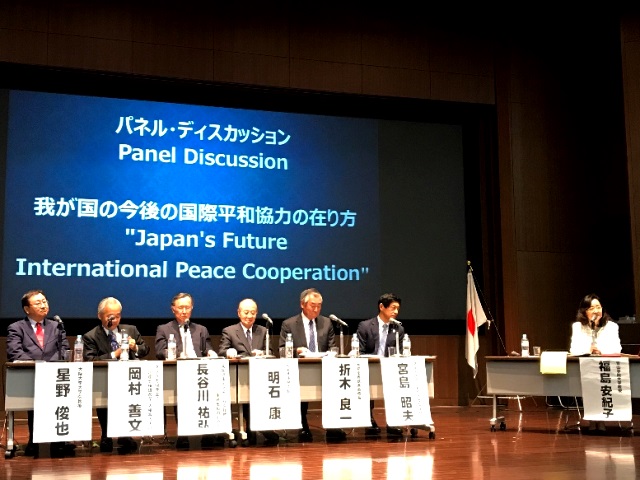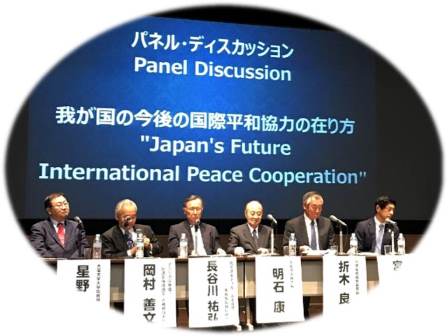Panelists discussed the issues and challenges facing Japan, ascertained Japan’s comparative advantage, and recommended what Japan should do in future international peace cooperation.

The panel discussion was held by six experienced practitioners of peace keeping operations and moderated by Professor Akiko Fukushima of Aoyama Gakuin University. The panelists were from right to left: Akio Miyajima, Director-General of the Secretariat of the International Peace Cooperation Headquarters of Cabinet Office, Ryoichi Oriki, former Integrated Staff Director of the Japan Self-Defense Forces, Yasushi Akashi, former Under-Secretary-General and Special Representative of the Secretary-General of the United Nations for Cambodia, Sukehiro Hasegawa, former Special Representative of the Secretary-General for Timor-Leste, Yoshifumi Okamura, Ambassador for TICAD, UN Reform and Human Rights, and Toshiya Hoshino, Professor of Graduate School of Osaka University.

The followings are some of the key points made during the panel discussion on Japan`s future international peace cooperation. They are compiled mostly from a Japanese language summary of the panel discussion produced by the Secretariat of the International Peace Cooperation Headquarters of Cabinet Office, but do not constitute an official translation. The official Japanese summary text follows after the English text.
・ The issues and challenges in international peace cooperation of Japan come down to the authority to use weapons. As the mandate of the PKO has been transformed to include difficult and complicated tasks such as the protection of civilians, it has become difficult to make a judgment on maintenance of neutrality and use of weapons.
・ When the UN PKO mission is given a civilian protection mandate, the United Nations itself may need to use weapons to ensure justice and human rights. If the civilians on one side of opposing forces are exposed to threats, as in the case of Cote d’Ivoire and South Sudan, the United Nations could be placed in a difficult position as it may need to use weapons to protect those civilians. Under these circumstances, there is a need to thoroughly examine the relationship between the United Nations’ three principles of peacekeeping and the Japan’s five principles for participation (in PKO).
・ Although recent developments in Japan’s legislation to legalize “kaketsuke keigo” (coming to the aid of PKO-related individuals upon urgent requests when unexpected dangers are imminent) and “joint protection of camps”, there are still many issues to be solved. It is essential that the tasks should be implemented without imposing burdens on those on the ground. It is necessary for Japan to establish a national strategy on UN PKO properly, and to consider purposes and targets of the deployment, and the extent of commitment Japan should make, keeping in mind its national interest to protect when Japanese personnel are deployed.
・ The issues and challenges of the United Nations PKO include such issues as requiring long time to dispatch, low level of mobility and code of conduct, crisis management and preparation for civilian protection have been carried out on an ad hoc basis without proper coordination in advance. It can also be pointed out that consistency of activities among civil, military and police components in the UN mission and humanitarian development agencies are not sufficient, that medical units and facilities are immature, and that they rely too much on military means.
・ As a result of the termination of deployment of Japanese PKO troops, opportunities to learn know-how and operations of overseas deployment have decreased. On the other hand, recognizing the importance of overseas deployment,deployment, in view of the increasingly severer security environment around Japan, it is necessary to consider what should be our priority and how to place overseas deployment of the SDF in our overall security policy.
・ Since communications between the headquarters and field missions are indispensable in the United Nations, it is important to develop human resources who have knowledge and expertise that can make judgments with understanding positions of the headquarters and without making major mistakes in the field.
・ Even under the robust PKO mandate, construction/rehabilitation of infrastructure and logistics support that Japan is good at continue to be necessary.
・ We should be confident in Japanese quality of being well-disciplined to work properly and produce results. Capacity building of local staff, manufacturing, collaborative activities with Japanese ODA are also the strength of Japanese PKO.
・ Japan has advantages in the fields of technology, communications and operational capabilities, not only in software but also in hardware. Also, although it may take some time for Japan to take actual actions, it’s a distinct characteristics of Japan to carry out the work properly once we decide to do so.
・ We can be proud of the soft side of characteristics of the Japanese engineering units, which constitute basis for their technological strength: undertaking work attentively, working and sweating together with local people instead of showing bossy attitude to them, and keeping things tidy and in order. The United Nations has also shown their interest for Japan to provide ecological expertise and new technologies such as drones.
・ Japan encourages local ownership (self-help efforts). In Asia, we have taken the approach of nurturing people and institutional frameworks to plant “seedlings of peace”, and we should fully make use of many experts with their know-how.
・ It is necessary for the Japanese general public to know both positive and negative sides of possibilities, limitations, and current situation of the PKO and to overcome the inward-looking pacifism and excessive cautiousness against unfound dangers. It is also important for the media to communicate the reality of hard work carried out by the PKO personnel in the field.
・ It is always important to constantly review the PKO Act (Act on Cooperation with United Nations Peacekeeping Operations and Other Operations), and the recent amendment of the PKO Act, which made it possible to dispatch personnel not only to UN PKO, but also to Internationally Coordinated Operations for Peace and Security is one of the examples of these reviews. In addition, activities related to peacebuilding and capacity building should be further expanded. For example, providing capacity building supports on a larger scale while focusing on specific areas could be an option. In addition to the SDF, it is necessary to elicit the cooperation in the field of civilian police including the utilization of ex-police officers, and the collaboration with ODA and NGOs. It is difficult to train and develop local military forces, but we may be able to expand activities to work on reform and development of security sector of local government.
・ It may be good idea for Japan to expand capacity building supports to emerging troop contributing countries, such as Cambodia. The capacity building project that Japan is currently working on in Africa to support rapid deployment of troops to the mission sites (African Rapid Deployment of Engineering Capabilities: ARDEC) has been highly appreciated. Moreover, Japan should further promote for Japanese civilian to occupy senior positions in the UN including field missions. Furthermore, establishment of United Nations PKO training center in Japan could also be an option.
・ It is important for Japan to engage political process in areas where security situation on the ground is fragile. Japan has been engaged politically in Asia, so Japan may well be engaged politically in Africa as well, based on the policy of “proactive contribution to peace”.
・ Conflict analysis is important. Cooperation between academics and practitioners is crucial, as it is reckless to involve in conflict without proper analysis. It is also important to take a leading position for principles and philosophy as is the case with the concept of Human Security.
・ Since approximately sixty percent of UNMISS personnel in South Sudan have been dispatched from Asian countries, strengthening of capacity of Asian personnel will also contribute to Africa.
・ It is difficult to dispatch PKO personnel when there is no public understanding. Regarding the withdrawal of the Japanese engineering unit from South Sudan, it is pity that good stories, such as that the SDF personnel have a sense of fulfillment after completing the mission, have not been well reported while only the negative side such as situation of the mission field is dangerous or severe has been emphasized. It is important to explain to the Japanese general public in an easy-to-understand manner how participation in UN peace operations can enhance national interests of Japan and what are Japan’s unique strengths in PKO.
・ It is critically important for the Japanese general public to realize that peace and national interests of their own country can only be achieved within the global framework, not in the sole pursuit of Japan’s national interest or through Japan-First strategy in the world today.
内閣府国際平和協力本部事務局HP 国際平和協力法25周年特設ページ: http://www.pko.go.jp/pko_j/info/pko25_potal.html
6月28日(水)午後、青山学院大学にて、国際平和協力法25周年記念公開シンポジウム「国際平和協力の現状と課題~世界の笑顔のために~」が、内閣府及び青山学院大学の共催、外務省、防衛省、国連広報センター及び国連大学の後援にて開催されました。このシンポジウムは、本年が国際平和協力法の施行から25年目の節目にあたることから、政府関係者や国内外の有識者とともに、我が国のこれまでの国際平和協力の取組を振り返りつつ、直面する課題や我が国に求められる国際貢献について議論し、今後の国際平和協力の在り方につき考える機会とするために開催されました。
第一部では、冒頭に安倍総理大臣からのビデオメッセージが映し出された後、明石元国連事務次長からの開会発言が行われ、そしてラクロワ国連平和維持活動(PKO)局長からのビデオメッセージが映し出され、内閣府国際平和協力研究員による研究報告も行われました。第二部では、宮島内閣府国際平和協力本部事務局長の発表に続いて、「我が国の今後の国際平和協力の在り方」と題して、各方面の有識者によるパネルディスカッションが行われ、活発な議論がなされました。シンポジウムには、政府関係者、在京外交団、NGO、報道関係者、学生等約320名の聴衆が参加しました。各講演の主要点及びパネルディスカッションの議論の概要は以下のとおりです。
・ これまで我が国は、国際平和協力法の下、延べ1万2千5百人を派遣し、国際社会から高い評価を得ている。しかし、国際平和協力法の成立に至る過程は決して平坦な道のりではなかった。湾岸危機においては、我が国は資金面では十分な貢献を行ったが、国際社会からは十分な評価を得ることはできなかった。このような中、人的な側面から、より積極的な国際貢献が必要との議論が高まり、厳しい審議の末、平成4年6月15日、国際平和協力法は成立した。今日、国民の約93%が、PKOに参加すべきと答えている。
・ 初めての本格的な活動として、国連カンボジア暫定機構に対して要員を派遣した。その中で、邦人お二人の尊い命が失われたことを、我々は決して忘れてはならない。また南スーダンでは、「駆け付け警護」など、平和安全法制に基づく新たな任務を自衛隊が担ったが、これは我が国の国際平和協力の歴史の中でも大きな意義を持つ。両国の首脳からは、我が国の貢献に対する感謝の言葉を頂いた。
・ 国際平和実現のための我が国の貢献は、PKOへの要員派遣に留まらない。PKOへの施設部隊への派遣を目指すアフリカの国々の要員訓練や、アフリカ各地のPKOセンターへの日本人教官の派遣を行っている。もちろん、アジアの国々に対する訓練も行っている。
・ 25年にわたる我が国の取組は、現地の人々の目線に立った支援、高い規律に基づく実直かつ丁寧な仕事の進め方で、派遣国政府、その国民、そして国際社会から、高い評価を得てきた。
・ 今や世界は、どの国も一国だけで平和を守ることができない時代である。我が国は、国際社会の責任あるメンバーとして、世界の平和と安定のために、その能力と責任に相応しい貢献を続けて行く必要がある。国際協調主義に基づく「積極的平和主義」の旗を高く掲げ、国際平和協力分野において、より一層積極的に貢献していくことを改めて強く決意する。
・ 国際平和協力法が審議されていた当時、カンボジアにおける国連暫定機構(UNTAC)の事務総長特別代表を務めており、日本初の本格的な要員派遣を目の当たりにした。文民警察官と国連ボランティアの二人が尊い犠牲となったが、日本にとって若葉マークのPKO参加は全体としては記憶してよい成果を収めることができた。
・ 国連平和維持活動は、国連憲章に明記されていないが、国連による最も代表的な活動として曲折と変貌を重ねながら発展し、今や国連による平和創出と維持のために欠くことのできない手段になっている。その中で、復旧復興事業、道路や橋の補修・建築、司法の確立、科学技術を駆使する輸送や通信能力、PKOに関係する人材の訓練など、日本が必要とされている分野は多い。
・ PKO関連の活動において、国際的・国内的課題も存在する。第一に、武器使用権限について、我が国独自の参加五原則は、国際的に認められた国連PKO三原則との整合性が問われている。第二に、PKO活動は国際社会の幅広い合意に基づいて行われる国連加盟国の共同活動であるところ、それが「侵略行為」に発展することは、おそらくありえず、また我が国憲法の諸原則と抵触することも考えられないが、この点に関してはより広範な国民的討論が必要かもしれない。
・ 国際社会における普遍的安全保障のために、我が国にふさわしい責務と役割を遂行することは当然であり、中でも国連の平和維持活動乃至国連の承認する多国籍軍に、積極的かつ前向きな態度をとることは一般的には望ましい。より平和で法と正義に基づいた国際社会の構築のために、私たちに何が要請されているのか、何をすべきか、国際平和協力法成立から25年にあたる本年はこれを考える絶好の機会である。
・ 日本は、財政面では上位3か国に入る貢献国として、政策面ではバンクーバーで開催予定のPKOに関する国防大臣会合の準備会合主催を通じて、そして活動面ではPKO部隊の訓練に対する資金供与や投資を通じて、PKOを支えてくれている。
・ PKOは、年間70億ドルを超える予算と、125か国から参加する約11万8千人の要員を持つ、国連の最も目に見える最大の活動の一つである。しかしPKOは、現代の紛争に対応するよう進化する必要がある。より柔軟なPKOのビジョンこそが、国連の平和と安全に関する構造の改革を巡る議論の中心になる考え方である。
・ PKO要員の95%以上は、文民保護をマンデートに持つミッションで活動している。国連PKOは、脅威の性質と能力において文民保護のマンデートを履行する上で限界があることを認識し、PKOに対する期待を調整するよう努めてきた。同時に、文民への脅威を予防し、効率的に対処するための能力を改善することが重要である。
・ 文民保護の強化には、マンデート履行のための大きな政治的戦略に、文民保護を含めなければならない。また、脅威の分析や文民保護の問題に関するミッション内部の調整や、危機管理対応を改善することも必要である。文民保護におけるPKO要員の説明責任、特に性的搾取・虐待に対するゼロ・トレランスポリシーも重要である。そのために、国連ミッション要員と、国連人道・開発機関職員の能力を統合する包括的な戦略の策定や、地域機構との緊密な協力や支援が不可欠である。
・ PKO改革が必要な理由として、紛争の性質及び数が変化していること並びにPKOの役割が変化していることの2つが挙げられる。国内紛争は2010年頃を境に増加傾向にあり、紛争の性質の変化についても一般の住民の被害が深刻になっていること等が見られる。これらの紛争に対応するため、PKOが強固な任務を与えられて大規模で複雑なものとなることがあり、そのため軍事要員と予算が増大している。
・ このような変化を受け、2015年に発表された国連平和活動に関するハイレベル独立パネル(HIPPO)の報告書では、PKO改革の重点課題として、紛争予防・紛争解決と文民保護が指摘されている。HIPPOは「持続的平和」を強調し、その実現には紛争当事者や国際社会による息の長い政治的関与が必要であること、軍事部門には、平和に至る前の和平プロセスを下支えする別の役割があることを指摘した。現在国連は、HIPPOの提言を踏まえ取組に着手し始めている。
(以上の発表に対し、星野俊也大阪大学大学院教授から、「持続的平和」及び「政治的コミットメント」への着目は重要であり、紛争の政治的な決着のためにはリーダーシップが鍵となるところ、日本としても現地のリーダーを支えることが重要である旨のコメントがなされた。)
・ 1992年に施行された国際平和協力法は、これまで3回の改正を行ったが、2015年の改正による「駆け付け警護」や宿営地の共同防護の新任務付与等は画期的なものであり、また、安全を確保しつつ有意義な活動が困難なら撤収する旨を南スーダンの実施計画で明記したことは、オペレーション面で重要な指針となった。
・ PKOへの参加に対する国民の理解と支持は不可欠である。内閣府による世論調査によると、国連PKO参加への支持は、1994年から2016年にかけて、83.9%から92.7%に増加した。他方、現在の我が国のPKO要員派遣は国連南スーダン・ミッション(UNMISS)の司令部要員4名のみで、これは全世界の派遣国128か国中113位にあたる。PKO予算分担率でも、我が国は現在10%を切っており、代わりに中国の財政貢献が急増した。
・ 我が国自衛隊施設部隊の5年超にわたるUNMISSへの派遣は、南スーダン政府・国連の双方から高い評価を受けた。施設部隊撤収にあたりUNMISSに対し、重機等の物資供与を行い、更には司令部要員の派遣は継続していることからも明らかなように、南スーダンを中途半端に投げ出した、危険だから撤収したのではない。また、国連PKOの性質が変化しており日本の役割は重要でなくなっている、といった見方は誤りである。その証左に、道路補修・退避壕敷設など施設部隊は不可欠な役割を果たした。
・ 現在我が国の国際平和協力は岐路にある。これから日本はどうすべきか、何をやっていくべきかを見直す必要がある。世界と共に生きる覚悟と決意を持って、日本らしさを発揮して、世界の平和の問題解決に汗を流し誠意を尽くすことが肝要である。
明石康元国連事務次長、岡村善文アフリカ開発会議・国連安保理改革・人権担当大使、折木良一元防衛省統合幕僚長、長谷川祐弘元国連東ティモール支援団事務総長特別代表、星野俊也大阪大学大学院教授、及び宮島昭夫内閣府国際平和協力本部事務局長(五十音順)をパネリスト、福島安紀子青山学院大学教授をモデレーターとして、主として以下の3点に関し議論が行われました。パネリストの発言の概要は以下のとおりです。
・ 我が国の国際平和協力における課題は、詰まるところ武器使用権限に関するものである。PKOが文民保護のような難しい任務に移行し、中立性や武器使用についての判断が難しくなっている中で、国連PKO3原則と我が国の参加5原則の関係についてよく考えなければならない。最近の法改正で「駆け付け警護」や共同防護で進展はあったが、まだまだ課題は多く、現場に負担を掛けずに任務を行わせるようにすることが本来あるべき姿である。PKOに関し我が国として国家戦略をきちんと立てるべきであり、派遣の目的や狙いについて、国としてどれだけの覚悟をもってやるべきか、国益も念頭に考える必要がある。
・ 国連が文民保護のマンデートを与えられる場合、正義や人権を確保するために国連自身が武器の使用を必要とすることがある。コートジボワールや南スーダンの例のように、対立する勢力の一方の側の市民が脅威に晒される場合、国連はそれを保護するために武器を使用する必要が生じる可能性があり、その場合は難しい立場に置かれることになる。
・ 国連PKOの課題としては、派遣までに時間を要すること、機動力や行動規範が低いこと、文民保護のための危機管理と準備が場当たり的であること、国連ミッション内での文民・軍事・警察・人道開発機関の間で一貫した活動が十分ではないこと、医療部隊・施設が未熟であること、軍事的手段に依拠しすぎていることが指摘できる。
・ 日本のPKO部隊派遣がなくなったことで、海外展開におけるノウハウやオペレーションを学べる機会が少なくなった。他方、国際的な派遣は重要であるものの、日本の安全保障環境が周辺地域で厳しくなる中、何を優先させるか、自衛隊の海外派遣をどのように位置付けるべきかを考える必要がある。
・ 国連においては本部と現地の間での意思疎通が重要であるところ、本部の考えを理解し現地で大きな間違いをしないような判断をできる知見を有する人材を養成しておくことも重要である。
・ PKOのマンデートが強靭になる中でも、日本が得意とするインフラ整備やロジスティクスは引き続き必要である。
・ 規律正しくきっちり仕事をして成果を残すという日本人らしさは自信を持つべきである。現地スタッフの能力強化、モノづくり、ODAと連携した取組も強みである。
・ 日本には、技術、通信、運用能力について、ソフトウェアのみならずハードウェアにも長所がある。また、日本は実際の行動に至るまでに時間がかかることがあるが、やると決めたらやることは特徴である。
・ 日本の施設部隊の丁寧な仕事ぶり、現地の人たちと一緒に汗をかく上から目線ではない態度、整理整頓といった、高い技術力を支えているソフト面での特徴は世界に誇れるものである。エコ技術やドローン技術にも国連から期待が寄せられている。
・ 日本はオーナーシップ(自助努力)を促す。アジアでは、「平和の苗」を植えるために人と制度を育てるというアプローチを取ってきたが、日本にはそのノウハウを持つ人材が多くいるので活用していくべきである。
・ 国民が、PKOの持つ可能性と限界やその現状について良い点も悪い点も知ることや、内向きな平和主義や危険に対する必要以上の警戒心を克服することが必要である。メディアが現場の要員の苦悩等の現実を伝えることも重要である。
・ 国際平和協力法については、見直しを行うことは常に重要で、最近の法改正で国連PKO以外の国際連携活動にも要員派遣を行えるようにしたことはその一例である。また、平和構築や能力構築に関する活動をもっと広げていくべきである。例えば、焦点を絞りつつもっと大規模に能力構築支援を行うことは一案である。自衛隊のみならず、OB・OGの活用も含めた警察の協力や、ODAやNGOとの連携も必要である。軍の育成は難しいが、治安部門の改革や育成についてもっと活動できるのではないか。
・ カンボジアのような新興の要員派遣国に対し、日本がもっと能力構築を行うことは良いのではないか。現在アフリカで行っている、現地に迅速に部隊派遣を行うための訓練プロジェクト(ARDEC)も評価されている。また、文民幹部の登用をより強く進めるべきである。さらに、日本に国連PKO訓練センターを設立することも一案である。
・ 現地の情勢が脆弱な地域に対して、日本が如何に「口出し」、すなわち政治的関与を行っていくかが大事である。日本はこれが得意ではないと言われるが、アジアでは政治面でも関与を行っているところ、積極的平和主義の考えに基づきアフリカでも政治面での関与を行っていければよい。
・ 紛争の分析が重要である。適切な分析なしに紛争に関与することは無謀であるところ、研究者と実務者の連携が重要である。また、人間の安全保障の概念のように、理念・哲学についても主導することが重要である。
・ 南スーダンのUNMISSの要員の6割はアジアの国々からの派遣であるところ、アジアの要員の強化はアフリカへの貢献にもなる。PKOへの派遣は国民の理解がないところで行うことは難しい。南スーダンからの施設部隊撤収に関連して、任務遂行後に自衛隊員が充実感を持っているといった良い話が伝わっておらず、危ないとか厳しいといった部分しか伝わっていないのは残念である。日本の国益や日本らしさについてわかりやすく説明することも重要である。
・ 自分の国の平和や利益は、グローバルな枠組みの中でしか達成できないということを国民がもっと知ることが大事である。日本のみの利益、ジャパン・ファーストだけでは達成できるわけでない時代であるということを、国民が認識することが重要である。




